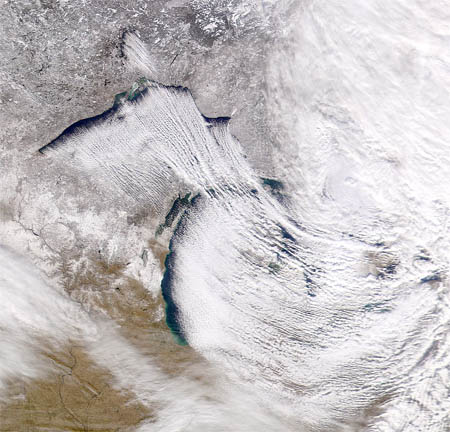Great Lakes Literacy, Principle Three – The Lakes influence local and regional weather and climate
Great Lakes Literacy is an understanding of the Great Lakes’ influence on you and your influence on the Great Lakes. Principle Three focuses on Great Lakes weather and climate effects.
This article is the fourth in a series of articles discussing what Great Lakes literacy means for residents of the state of Michigan and the Great Lakes region.
Great Lakes Literacy Principle Two
Great Lakes Literacy Principle Four & Five
The Great Lakes affect weather and climate by impacting the
basin’s energy and water cycles. Changes in the Great Lakes’ water circulation,
water temperatures and ice cover can produce  changes in weather patterns.
changes in weather patterns.
The Great Lakes warm by absorbing solar radiation. Lake temperatures are also affected, locally, by the temperature of inflowing river waters. The Great Lakes lose heat by evaporation and by the warming of overlying air when the atmosphere is cool. After water vapor is released into the atmosphere, it condenses and forms precipitation, some of which falls within the Great Lakes basin.
The Great Lakes modify the local weather and climate. Because water temperatures change more slowly than land temperatures, lake waters gain heat in summer and release heat during cooler months. This results in cooler springs, warmer falls, delayed frosts and lake-effect snow.
The Great Lakes have a significant influence on regional climate by absorbing, storing and moving heat and water. Lake-effect precipitation can occur downwind when major weather systems move over the lakes.
The Great Lakes are influenced by larger climate change patterns affecting North America and the world. Climate patterns in the Great Lakes are changing, with warmer and drier conditions predicted.
MSU Extension and Michigan Sea Grant offer many opportunities to learn more about the Great Lakes, with educational opportunities such as the Great Lakes Education Program, Summer Discovery Cruises, and 4-H Great Lakes & Natural Resources Camp. For educators, Teaching with Great Lakes Data professional development workshops and accompanying website offer many ways to include historical and real-time Great Lakes weather and climate data in the classroom. You may also find additional resources from our “What’s So Great about the Great Lakes?” online workshop at the College of Exploration under the COSEE Great Lakes section.
This article was adapted from Great Lakes Literacy: Essential Principles and Fundamental Concepts for Great Lakes Learning (Ohio Sea Grant, 2010).



 Print
Print Email
Email


